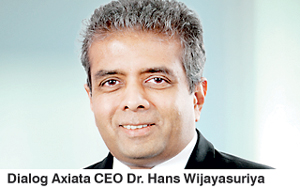Tuesday Feb 24, 2026
Tuesday Feb 24, 2026
Friday, 5 June 2015 00:03 - - {{hitsCtrl.values.hits}}
By Channa Fernandopulle
Heavy taxation of the telecom industry is likely to constrain Dialog Axiata Plc’s capacity to invest in infrastructure development in 2015.
The Group expects to b e hit with a Rs. 3 billion levy under the Super Gains Tax proposed in the draft Finance Bill tabled in Parliament while the proposed Telecommunication Levy (Amendment Bill) – if legislated – is expected to impose a 25% tax on telecom operators based on the value of supply but excluding internet services.
e hit with a Rs. 3 billion levy under the Super Gains Tax proposed in the draft Finance Bill tabled in Parliament while the proposed Telecommunication Levy (Amendment Bill) – if legislated – is expected to impose a 25% tax on telecom operators based on the value of supply but excluding internet services.
The Group has invested a total of $ 1.74 billion in Sri Lanka, of which $ 116.3 million was invested during in the 2014 financial year.
Commenting on the Group’s position relative to the two taxes in his statement for the Group Annual Report 2014, Dialog Axiata CEO Dr. Hans Wijayasuriya said: “We are duly cognisant of the potential extraneous dilution of cash flows available for investment due to impacts arising from the Interim Budget 2015 of the Government of Sri Lanka. If legislated, this levy will no doubt draw considerably on the operating cash flows of the Group and hence on the investing capacity during the year ahead.”
Elaborating on the Group’s strategic vision going forward, Wijayasuriya stated that data pricing, viable returns on broadband infrastructure investment, neutrality in service taxation across traditional channels and disruptive ‘Over the Top’ (OTT) services like Whatsapp – that are free or zero cost – would be critical to preserving and growing the business moving forward.
“I share the concern of industry counterparts that the capability of the sector to deliver real economic returns to shareholders, maybe at risk in the medium term unless structural corrections with respect to industry pricing and cost structures are implemented on an immediate basis.
“It is of particular concern that today broadband pricing appears to be sub-cost and to be subsidised by domestic and international voice services. The resulting cost versus revenue formulation is both precarious and foolhardy in the context of the very real risk of voice revenue erosion ahead,” Wijayasuriya cautioned.
He added that the Group’s efforts to establish a nation-wide fibre optic cable network parallel to initiatives to connect Sri Lanka to the global internet via the Bay of Bengal Gateway cable project would be crucial to supplementing high speed broadband connections in the country.
Commenting on the impact of OTT services, he noted that telecommunications sector contributions to government revenue around the world had been eroded by such services which are not easily taxable yet eat into numerous streams of telco revenue as evidenced by the depletion of international termination and IDD revenues, mutation of voice revenue growth and a declining trend in SMS revenues.
“As evident from hotly-contested net-neutrality and sovereign taxation based debates in advanced markets such as the USA and European Union, an era where the rich contribution to government revenues from the telecommunications sector evaporates at exponential pace could well be imminent in Sri Lanka and other regional markets,” Wijayasuriya warned.
He further noted that industry consolidation, profitable data pricing, network sharing and collaborative investments with a focus on consumer affordability balanced with fair returns to service providers would be required to form a principle policy framework for a sustainable telecom industry in Sri Lanka.
“We view the future with extreme diligence but equally with an abundance of excitement and unbridled energy which we will harness in capturing every available opportunity for growth and advancement. Our people, systems and innovation driven process are finely aligned with the emerging digital era and the Dialog Group is confident in its capability to deliver superlative social and economic dividends to Sri Lankan citizens through the inclusive proliferation of digital empowerment,” he concluded.